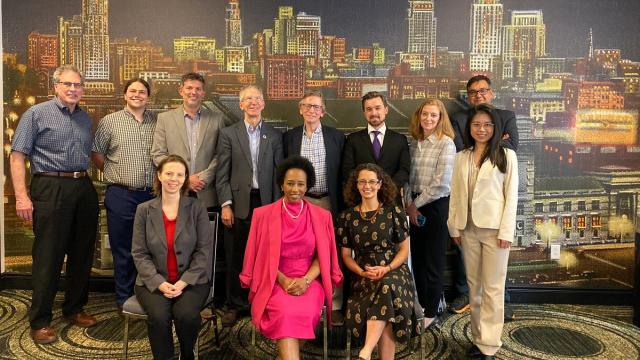SDSN USA Hosts Regional Decarbonization Pathways Workshop
On Friday, June 21, SDSN USA, in collaboration with the University of California, San Diego (UCSD) and with support from the University Energy Institute Collaborative (UEIC), hosted the Regional Decarbonization Pathways Workshop in Kansas City, Missouri alongside the U.S. Conference of Mayors. Moderated by Elena Crete, Head of the SDSN Climate & Energy Program, and Dr. Gordon McCord, Co-Chair of SDSN USA at the University of California, San Diego, the workshop provided a forum to share key university-government decarbonization partnership case studies, discuss best practices, prioritize future research, and provide signals to policymakers for a zero emissions future.
The successful execution of the workshop will help build new connections between university-based decarbonization researchers and local governments, elevate and communicate proven solutions, and accelerate the transition to net zero by increasing support for and leading to policy changes in the decade ahead. The workshop also included in-depth case-study presentations on data usage and collection.
Participants engaged in fruitful discussions related to decarbonization pathways at different levels of government and society. These discussions focused on planning conversations with policymakers and government officials– specifically what topics to include in a decarbonization analysis, including:
- Comparing costs of actions versus inaction (e.g., cost of not mitigating) and understanding the complex temporal dimensions included in this kind of analysis.
- Identifying the benefits of defining “net” zero, as well as identify how much companies should be paying for carbon emissions and their role in economic development.
- Exploring how the decarbonization/renewable energy transition will be financed.
- Assessing assumptions and thinking critically about modeling choices and results (e.g. least-cost focus, lifecycle, boundary conditions, etc.).
- Determine if and how to incorporate uncertain climate change impacts and resilience planning into your analysis.
- Increasing integration with other jurisdictions around electrical generation, procurement, and planning.
- Several participants supported the concept of a local or national “energy concierge” to guide citizens or local jurisdictions toward effective action.
Participants were asked toward the end of the day to consider how university-government partnerships can be created and mobilized to address these challenges and how the SDSN USA network can support them in these efforts. SDSN USA looks forward to using the lessons learned in this workshop to continue leveraging the knowledge and trust of the network to support governments across the country in their efforts to advance science-based policymaking for decarbonization.
To learn more about long-term decarbonization pathways in the US, please visit the SDSN USA website. You can also visit the SDSN Climate and Energy program webpage for related convenings, research, and tools information.
